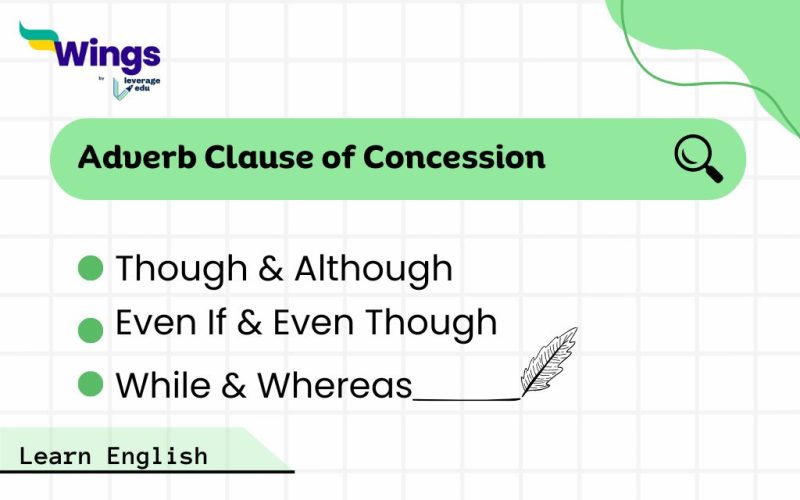The adverb clause of concession particularly throws in a “but wait, there’s more!” twist within a sentence in English. This clause shows the fact that seems to oppose the main idea, but then the sentence continues to explain why the main idea still holds true. They introduce the “concession” part of the sentence with words like “although,” “even though,” “while,” “despite,” and “in spite of”. In this blog, you will have a clear understanding of adverb clause meaning, examples, and much more to avoid any grammatical errors while using it in future.
This Blog Includes:
Read more: Adverb Clause of Purpose with Meaning, Usage, and Examples
What is the Adverb Clause of Concession? – Meaning
In a small sentence, it works like an adverb, adding information to the main sentence. This means accepting something that might oppose the main idea. An adverb clause of concession is like saying “But wait, there’s more” to your sentence. It shows the fact that admits something unexpected or even opposite to what the main sentence has to display.
List of Adverb Clause of Concession
Have a look at the adverb clause of concession with the example listed below for further knowledge:
Adverb Clause of Concession – Uses and Examples
An adverb clauses of concession are introduced by subordinating conjunctions although, though, even though, even if, while and whereas.
Though and Although
When you look at ‘though’ and ‘although’ individually, both can be utilised as conjunctions with the same meaning. Though and although mean ‘even if’ and similar ideas’, ‘in spite of the fact that’.
- Though she is poor, she is always neatly dressed.
- Though he hates me, I will always help you faithfully.
- He would like to go out although it is Sun.
Even If and Even Though
Even if not utilised as a conjunction, we can use the words ‘even if’ and ‘even though’ to join two clauses.
- He will go even if you forbid me to.
- She enjoyed the film even though I had a headache.
- The women managed to survive even though they had nothing to eat or drink.
- Even if he fails, he will try again and again until I succeed.
While and Whereas
While and whereas together function as conjunctions, but they do have some key differences.
- While he admires your courage, he thinks you ought not to go on this dangerous journey.
- While it is true that I have some land and houses, I do not have liquid cash to invest in the industry.
- Whereas Amisha had more enemies than friends, her brother was quite popular.
Read more: 30+ Adverb Clauses Examples in English
Adverb Clause of Concession Exercise
Related reads
FAQs
Concession clauses are used to reflect a contrast between two clauses. Such as: She is mean to me still I love him.
A concession can be written as short as a sentence or two, or it could also be as long as several paragraphs.
In a particular sentence, when you have the same subject in both the primary clause and the adverb clause, then you can reduce the adverb clause to avoid repeating the subject. When we talk about the reduced adverb clause then it becomes an adverb phrase, which does not have a subject.
This was all about the adverb clause of concession in English grammar. Hope you understand the concept and know how to proceed. You can also follow the page of Leverage Edu for more exciting and informative blogs.
 One app for all your study abroad needs
One app for all your study abroad needs














 45,000+ students realised their study abroad dream with us. Take the first step today.
45,000+ students realised their study abroad dream with us. Take the first step today.

